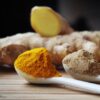- Iron is an essential mineral that we all need to help transport oxygen throughout the body. It is crucial in the development of red blood cells and energy production, whilst helping to support a healthy immune system.
- When iron stores are depleted, it means that minimal oxygen is being transported to the body’s cells. This can result anywhere from fatigue to iron-deficiency anaemia.
- Iron in food sources can come in two types – haem iron (found in animal sources such as red meat, pork, poultry, oysters) and non-haem iron (found in plant sources such as grains, wholegrain cereals, green leafy vegetables, lentils, sunflower and pumpkin seeds).
- Haem iron is more readily absorbed by the body than non-haem iron, even though the two food sources may contain the same amount of iron.
- To ensure that you are absorbing iron, include Vitamin C in your meal as it increases the level of iron absorption.
- Some factors that increase the need for iron include heavy menstrual cycles, pregnancy, rapid growth stages in early childhood and adolescence, vegetarianism, veganism and athletes.
- The Recommended Daily Intake (RDI) for men aged 19-70 years is 8 mg/day.
- The RDI for women aged 19-50 years is 18 mg/day, then drops back to 8 mg/day after the age of 51 years.
- Iron stores major source of depletion is through blood loss, therefore it needs to be replenished through the diet.
- Take care when it comes to iron supplementation as toxicity can also have very severe consequences. It is vital that you seek professional advice before commencing iron supplementation.
More RDI’s can be found here https://www.nrv.gov.au/nutrients/iron
Image source beautyheaven.com.au





